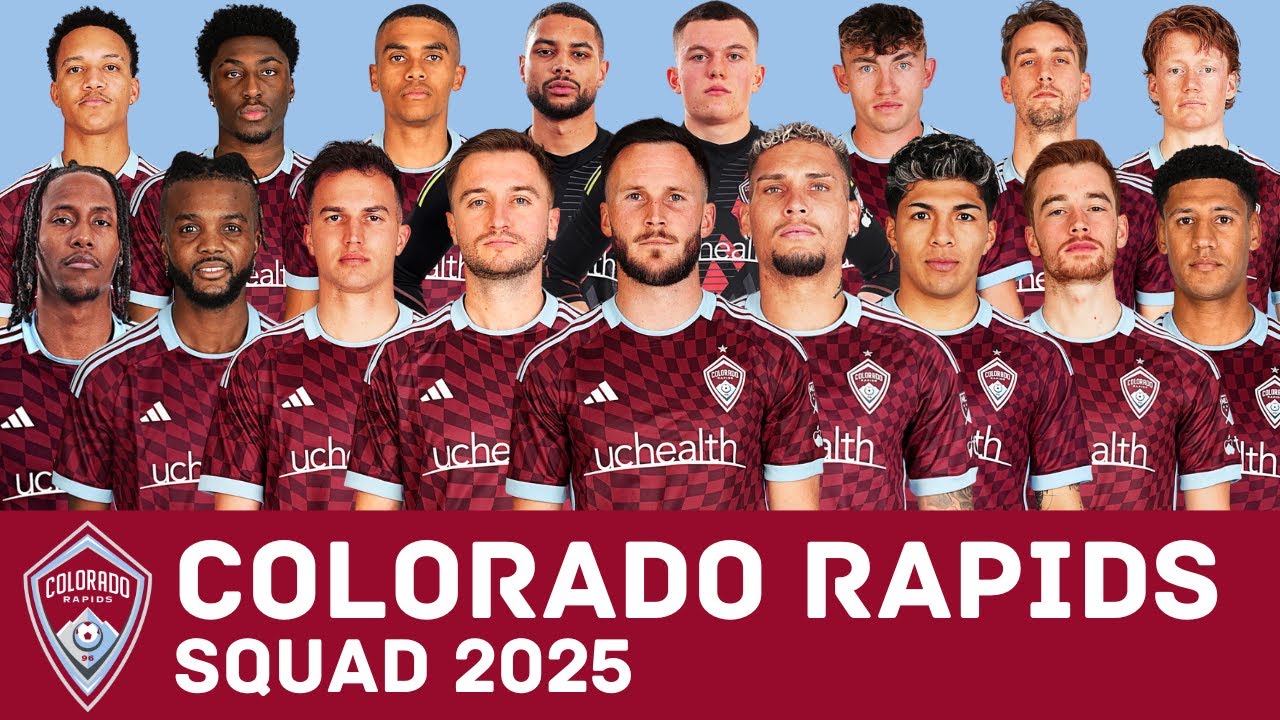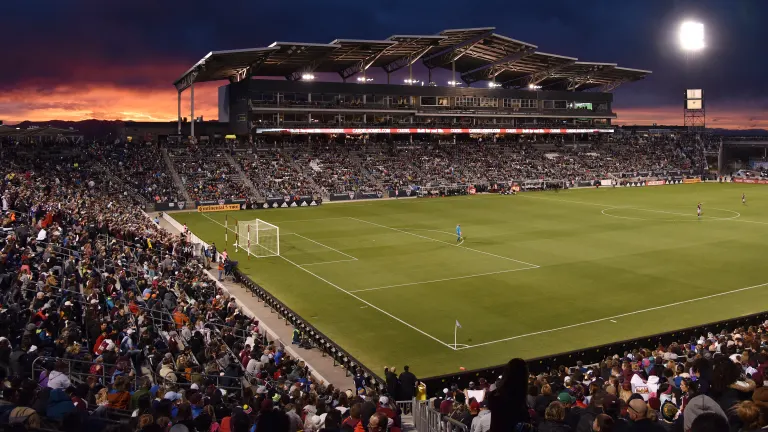MLS
Colorado Rapids: Pioneers of Rocky Mountain Soccer

Colorado Rapids: Pioneers of Rocky Mountain Soccer
Colorado Rapids is one of Major League Soccer’s original clubs, founded in 1996 as part of the league’s inaugural expansion beyond its charter teams. Based in Denver, the Rapids have been instrumental in establishing professional soccer in the Rocky Mountain region, helping grow the sport in a state historically dominated by football, basketball, and baseball. The club’s founding represented a strategic move to tap into Colorado’s passionate youth soccer base and culturally diverse population, creating a professional outlet for fans and aspiring players alike.
The Rapids’ early years were characterized by the challenges typical of a new franchise in a fledgling league. The team worked to develop its identity, attract talented players, and cultivate a fan base in Denver and across the state. Despite the hurdles, Colorado quickly became known for its commitment to exciting, competitive soccer and for building a culture rooted in community engagement and regional pride.
Colorado Rapids’ colors—burgundy, sky blue, and white—reflect both the state’s mountainous landscapes and the vibrant, modern energy of Denver. The team crest features a stylized mountain range above a soccer ball, symbolizing the fusion of regional identity and the universal language of the sport. Early kits embraced traditional designs while modern iterations have incorporated bold graphics and alternate colorways, appealing to both long-time fans and new supporters.
The franchise’s first major success came in 2010 when the Rapids captured the MLS Cup, defeating FC Dallas 2–1 in a thrilling final. Led by manager Gary Smith and anchored by standout players like Pablo Mastroeni, Conor Casey, and Omar Cummings, the team displayed tactical discipline, resilience, and high-intensity soccer. This victory not only cemented Colorado’s place in league history but also provided a lasting sense of identity and accomplishment for fans, players, and the Denver soccer community.
Over the years, Colorado Rapids have focused on blending experienced veterans with promising talent from both domestic and international sources. This approach has allowed the club to remain competitive despite fluctuations in roster quality, league expansion, and coaching changes. The Rapids have also prioritized youth development, establishing an academy system and partnerships with local soccer organizations to foster the next generation of professional players.
Trivia: Colorado Rapids were the first MLS team to field a starting lineup entirely composed of players from outside the United States in 1998, showcasing their early commitment to international talent integration.
Supporter culture has been central to the Rapids’ identity. Groups like the Centennial 38, Mad Green Boys, and Screaming Eagles have created some of the loudest and most organized atmospheres in MLS, particularly at Dick’s Sporting Goods Park. Coordinated chants, tifos, and fan-led initiatives have become a hallmark of Rapids games, energizing players and intimidating visiting teams.
Rivalries
Rivalries are central to the Colorado Rapids’ competitive identity, providing both intensity on the pitch and engagement off it. The most prominent rivalry is with Real Salt Lake, known as the Rocky Mountain Cup. This rivalry dates back to MLS’s early expansion era and embodies the geographic, cultural, and sporting pride of the Rocky Mountain region. Matches are fiercely contested, and victories carry bragging rights, media attention, and significant fan celebration. The Rocky Mountain Cup itself is awarded annually based on the aggregate results of the two teams’ regular-season matches.
Other rivalries have developed with Western Conference opponents, including the LA Galaxy, Seattle Sounders FC, and Sporting Kansas City. These rivalries often have playoff implications or are fueled by high-stakes matches, tactical battles, and player narratives. For example, games against LA Galaxy frequently feature dramatic finishes and high-profile players, creating memorable moments in the Rapids’ history.
Trivia: The Rocky Mountain Cup trophy features a stylized mountain range and is one of MLS’s oldest and most passionately contested rivalry trophies, first awarded in 2005. The supporters of both clubs actively campaign to make these matches a cultural event, emphasizing the regional pride behind the rivalry.
Colorado Rapids: Ownership
Colorado Rapids is owned by Kroenke Sports & Entertainment (KSE), the same organization that owns multiple high-profile sports teams, including the NBA’s Denver Nuggets, the NFL’s Los Angeles Rams, and the NHL’s Colorado Avalanche. KSE’s ownership provides financial stability, strategic direction, and operational expertise, allowing the Rapids to invest in facilities, staff, and player development while maintaining a competitive presence in MLS.
Under KSE, Colorado has focused on long-term sustainability, community engagement, and soccer-specific infrastructure. Investments in analytics, scouting, and youth development have strengthened the club’s foundation, enabling it to compete effectively while nurturing homegrown talent. This approach reflects a balance between financial prudence and competitive ambition, ensuring that the Rapids remain a respected and enduring franchise in MLS.
Trivia: Kroenke Sports & Entertainment is one of the few multi-sport ownership groups in North America to maintain successful professional franchises across multiple leagues while actively supporting youth and community initiatives for each team.

Watch Colorado Rapids
Colorado Rapids play at Dick’s Sporting Goods Park, a soccer-specific stadium located in Commerce City, just outside Denver. Opened in 2007, the stadium has a seating capacity of approximately 18,000 for MLS matches and offers premium amenities, fan-friendly sightlines, and a pitch designed to withstand Colorado’s variable climate.
The Centennial 38 supporters’ section is located at the south end, creating a formidable atmosphere through coordinated chants, banners, and visual displays. This section, along with the Mad Green Boys and Screaming Eagles, has helped establish Dick’s Sporting Goods Park as one of MLS’s most electric home environments. The stadium is also used for concerts, community events, and youth soccer programs, ensuring it serves as a central hub for soccer culture in Colorado.
Trivia: Dick’s Sporting Goods Park features a 360-degree concourse, enabling fans to circulate while staying close to the action. The stadium also includes a training facility and academy fields, creating a comprehensive soccer environment that supports both professional and youth development.
Colorado Rapids: This Season
The 2025 MLS season finds Colorado Rapids blending experienced MLS professionals with emerging talent, emphasizing tactical versatility and high-intensity play. Key players include midfielder Jack Price, forward Jonathan Lewis, and goalkeeper William Yarbrough, each providing leadership, skill, and consistency. Academy graduates like Cole Bassett add creativity and pace to the midfield, reflecting the club’s commitment to homegrown development.
Head coach Robin Fraser employs a tactical approach centered on pressing, quick transitions, and structured defensive organization. Offensively, the team seeks to dominate possession and create opportunities through intelligent movement, width exploitation, and clinical finishing. Defensively, the Rapids maintain compact lines while utilizing counter-pressing to disrupt opponents’ rhythm.
Fixtures against Real Salt Lake, LA Galaxy, and Seattle Sounders FC are key challenges, with each match offering tactical intrigue and playoff implications. Colorado’s emphasis on squad depth allows it to remain competitive across MLS’s demanding schedule, while the combination of veteran experience and youthful energy positions the Rapids as a contender in the Western Conference.
Trivia: Cole Bassett, a Colorado Rapids academy graduate, made his MLS debut at just 17 and has become a central figure in the club’s midfield, illustrating the success of the club’s youth development programs.
Colorado Rapids: What to Follow
Several storylines define Colorado Rapids’ trajectory in 2025 and beyond. First, youth development remains a cornerstone. The Rapids Academy continues to produce players capable of contributing to the first team and national programs, ensuring long-term sustainability and competitiveness.
Second, supporter culture remains vital to the club’s identity. Groups like Centennial 38, Mad Green Boys, and Screaming Eagles ensure home matches at Dick’s Sporting Goods Park are high-energy spectacles, combining chants, banners, and visual creativity that are recognized across MLS.
Third, competitive success continues to be a priority. Colorado Rapids aim to secure consistent playoff appearances, contend for the U.S. Open Cup, and challenge for MLS Cup honors. Strategic acquisitions, tactical flexibility, and squad cohesion are critical to sustaining long-term success.
Finally, community engagement and regional identity define the club. Colorado Rapids actively participate in charitable initiatives, youth programs, and civic events, integrating the club into Colorado’s broader cultural and social landscape.
Trivia: Colorado Rapids were the first MLS team to host an outdoor home game above 5,000 feet in altitude, creating a unique home-field advantage due to Denver’s thin air and challenging conditions for visiting teams.
Colorado Rapids represents the fusion of sport, culture, and community in Colorado. From the chants of Centennial 38 to the tactical battles on the pitch, the Rapids have established themselves as a respected and enduring MLS franchise. With strategic ownership, passionate fans, and a commitment to youth development and competitive excellence, the club’s trajectory points to continued influence and success in North American soccer.
